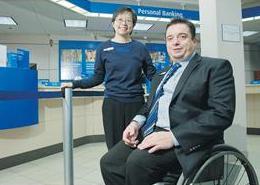 By Darah Hansen, Postmedia News; Vancouver Sun
By Darah Hansen, Postmedia News; Vancouver Sun
Ken Hall had only been working at the Bank of Montreal a few days when he found himself face-to-face with a particularly tactless customer.
“Oh, wow. They’re hiring people like you here?” a woman asked him as she stared with surprise at his wheelchair.
Hall wasn’t fazed.
The ex-wheelchair basketball champ and Paralympic gold medallist has spent much of his adult life answering questions about that chair, and the reasons behind his restricted ability to walk.
His role as a public speaker has taken him into hundreds of schools and public forums on a mission to dispel commonly held misconceptions about what it means to be disabled.
He saw that morning in the bank as just another opportunity to do the same, defused the situation with calm reassurance that he was able to do pretty much what all the other tellers can do, just from a seated position.
Hall, 41, is one of 10 physically disabled employees recently hired by the Bank of Montreal in Vancouver.
The new employees, who began work at various branches across the Metro region in May, were recruited through an innovative training program that matches people who have physical disabilities with employers who are looking to recruit talent in an increasingly diverse and competitive hiring market.
BMO has been actively recruiting from this particular demographic in Ontario since 2005, after studies showed workers with physical disabilities had higher-than-average retention rates yet were chronically overlooked through regular recruitment.
Less than 20 per cent of the nation’s population lives with a disability, but 70 per cent of that group is unemployed, according to Statistics Canada.
BMO’s pre-employment training program, which was unveiled in Vancouver in January, allows the bank to work with various community groups to identify potential employees.
The candidates then undergo six weeks of professional coaching and training to help get them job-ready.
That also gives the bank the opportunity to assess any accommodation needs of the recruits, such as text-magnifying programs for people with visual impairments or adjusting the work station to allow for wheelchair access.
Levels of physical disability and the needs of candidates vary with each individual.
All teller Sophia Deer needed to get down to work was a specialized pen with a larger-than-average barrel, a wrist splint to support her right hand, and the chance to prove she can do the job.
Deer, 47, has rheumatoid arthritis, a chronic inflammatory disorder that forced her out of a promising career with the Canadian navy in the 1990s and limited her work options.
More recently, after she was finally able to stabilize her condition, Deer completed her certification in professional accounting, but found few employers willing to give her a chance to compete.
“When I applied for jobs, I never got a call back,” she said. Deer learned about BMO’s pre-employment training program through the Greater Vancouver Business Leadership Network, an organization that helps disabled people find work.
She started full-time work with BMO in May, and said she’s never been healthier.
“I’ve found that my condition has simmered down. I am clear-headed. I am the second one to get (there) in the morning and I am working full hours … Everything is great.”
Hall is also pleased with his new-found banking career, following his retirement from professional sports.
“It’s helped me grow in my abilities to not just provide customer service, but also work on the sales side,” he said of the full-time teller position.
Hall said public perception was the biggest obstacle he faced in his job hunt: “It’s the belief by the employer that a suitable and successful candidate can be someone whose physical abilities might be slightly affected or they do things in a different way than we’re used to.”
But he also found that not every workplace is willing, or even able, to accommodate a wheelchair.
At BMO, his work station has been modified to meet his particular needs, including ensuring him a spot at the front counter that gives him the space to move around as well as ready access to equipment such as the photocopier.
That he’s been put on the front lines of customer service, rather than a back office, is his biggest professional bonus.
Every customer who comes into the bank gives him the opportunity to continue his work to break down stereotypes that limit the disabled.
“Hopefully when they leave they’ll have a different understanding or belief in people who get around differently or do things slightly differently than others,” he said.
